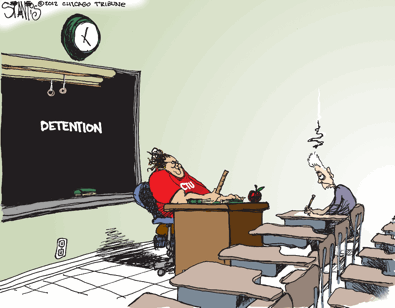|
Group sponsors new Emanuel strike ad, while another group funds ads thanking teachers
Wednesday, Sep 19, 2012 - Posted by Rich Miller * A group called Education Reform Now Advocacy, which is the political arm of Education Reform Now, Inc., is running a new TV ad in Chicago featuring Mayor Rahm Emanuel. Hizzoner talks about the strike and what was accomplished. * Script…
[Via] Discuss. …Adding… Sun-Times…
…Adding More… I may have already posted this one, but the Progressive Change Campaign Committee is running a TV ad thanking the teachers… …Adding Even More… Stantis’ new cartoon… 
|
|
Protected: SUBSCRIBERS ONLY: Supplement to today’s edition, crosstabs and some important campaign updates
Wednesday, Sep 19, 2012 - Posted by Rich Miller
|
|
*** UPDATED x1 - Jackson issues explanation *** Jackson camp mum about house for sale
Wednesday, Sep 19, 2012 - Posted by Rich Miller *** UPDATE *** From Congressman Jackson’s office…
* Unsurprisingly, this move is causing a heckuva lot of speculation about Congressman Jackson’s future. Lynn Sweet…
* Tribune…
* Crain’s…
* Politico…
* Greg Hinz…
Jackson’s people have not yet responded to any of my inquiries. I’ll let you know if they do. * Meanwhile…
|
|
AFSCME protests DCFS cuts
Wednesday, Sep 19, 2012 - Posted by Rich Miller * Budget cuts could mean more families are broken up…
* AFSCME sent out this press release yesterday announcing a protest…
* A photo from the rally. Click the pic for a larger image…  * Gov. Pat Quinn was asked about the DCFS cuts today. The governor reiterated his position that he tried to preserve DCFS funding with a $50 million veto of the prison budgets. Listen… Legislators with prisons in their districts are hoping to override the governor’s veto. AFSCME is in the middle of a lousy argument here. Close prisons or cut DCFS? The union doesn’t want either. I’m not sure that’ll work.
|
|
*** UPDATED x1 *** Schilling vs. Bustos: Pat Quinn, China, outsourcing, Sensata - Plus: Pundit rankings
Wednesday, Sep 19, 2012 - Posted by Rich Miller * Republican Congressman Bobby Schilling has a new TV ad that ties Democrat Cheri Bustos to Gov. Pat Quinn and China. Rate it… * Script…
Quinn is hugely unpopular everywhere, so that ad ain’t good for Bustos at all. And Schilling employs a clever visual with that fake “Cheri Bustos endorsed by PAT QUINN” billboard in the background…  Like I always say, turn off the sound to best rate a TV ad’s effectiveness. And that billboard works quite well with the sound off. * I asked the Schilling campaign to provide details of the Chinese company mentioned in the ad. They pointed to Bustos’ financial disclosure statement which lists the Janus Overseas Fund. Bustos reported having between $15,000 to $50,000 invested in the fund. From page 4 of that fund’s 2nd Quarter 2012 report…
The Schilling campaign didn’t point it out, but this is also from page 4…
I’ve asked the Bustos campaign for a response. They’re researching it as I write this. But Bustos should’ve cleansed her portfolio of that fund a long time ago. No excuse there. * I mentioned the Hong Kong outsourcing company because, as the Schilling ad clearly shows, outsourcing is a huge issue in this campaign. The Bustos operation has a fact sheet on Schilling’s outsourcing record. Click here to read it. * And speaking of outsourcing, Bustos has a new TV ad which claims that “Congressman Schilling wants to keep using our tax dollars to reward companies for shipping jobs overseas, and I’ll stop them.” Have a look… * The 17th District contains a whole lot of manufacturing plants and unionized workers…
* Schilling’s retort…
* In other 17th District outsourcing news, Bustos’ campaign sent out this press release and video today…
* The video… Looks like things got pretty darned heated on the workers’ side. * From Schilling’s campaign manager…
A bit on the harsh side, but he was frank, at least. *** UPDATE *** The Schilling campaign has released the complete video of the town hall meeting… * And, finally, the Telegraph Herald has pundit rankings for this race…
* And…
|
|
*** UPDATED x1 - Plummer reacts *** Dem poll has Enyart leading Plummer
Wednesday, Sep 19, 2012 - Posted by Rich Miller * From The Hill…
* I’m not so sure I buy into those numbers totally because Obama is leading by so much in the poll. We Ask America’s polling from earlier this month had Obama ahead of Romney by just one point, 47-46, in the 618 area code. The area code covers a huge swath of Illinois, and the 12th is a Democratic-leaning district, but nine points is quite large, although, I suppose, not totally out of the question because the poll was conducted before the end of the Democratic convention. We Ask America had this at 45-34 for Plummer back in July. But that was before many people knew who Enyart was. * And Enyart is still struggling to get known, according to the Democrats’ own poll…  * Average the two known polls together and we get 43 for Plummer and 41.5 for Enyart. I’m hearing from other sources that this has indeed become a very close race, so the average may be nearer to what we actually have there. *** UPDATE *** Plummer reacts…
After I posted this story, I talked to some more people and I’m more convinced than ever that this is a very tight race.
|
|
Now or Never PAC goes big for Walsh
Wednesday, Sep 19, 2012 - Posted by Rich Miller * A super conservative Super PAC is spending super bucks on Joe Walsh…
* Rate it… * Meanwhile…
Discuss.
|
|
Question of the day
Wednesday, Sep 19, 2012 - Posted by Rich Miller * Who were the biggest winners and losers in the Chicago teachers strike? Explain.
|
|
Protected: SUBSCRIBERS ONLY - Today’s edition of Capitol Fax (use all CAPS in password)
Wednesday, Sep 19, 2012 - Posted by Rich Miller
|
| « NEWER POSTS | PREVIOUS POSTS » |
















